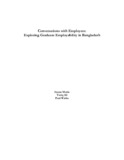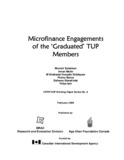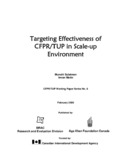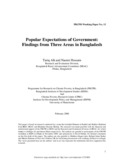Working Papers (BRAC Institute of Governance and Development)
Browse by
Recent Submissions
-
The savings and growth nexus in Bangladesh
(BIGD, 2021-09)The paper investigates the causal relationship between Bangladesh’s gross domestic savings (GDS) and gross domestic product (GDP) in the years 1980 to 2018. Using yearly time series data from the period, the authors employ ... -
Livelihood transitions of women workers during COVID-19: The case of domestic workers in Dhaka
(BIGD, 2021-12-12)The paper draws on primary research into the conditions of domestic workers in Bangladesh and how they coped with the shocks and disruptions associated with COVID-19. We can see our research as a lens to view the lives and ... -
Livelihood transitions and coping with shocks: Women in the Ready-Made Garment (RMG) sector coping with COVID-19
(BIGD, 2022-01-03)This paper examines in detail the experiences of a small group of workers from the export-oriented ready-made garment (RMG) industry in Bangladesh and how they coped with the shocks and disruptions associated with COVID-19. ... -
Achieving scale collectively
(National Bureau of Economic Research, 2021-06)This cross-sectional assessment surveyed 1,115 firms and 2,883 employees between 2018 and 2019 in the Central, Western, and Eastern regions of Uganda to understand the importance of the rental market to productivity in ... -
Recovery with distress: Unpacking COVID-19 impact on livelihoods and poverty in Bangladesh
(United Nations University World Institute for Development Economics Research, 2022-02)The social and economic impact of COVID-19 has been deep, wide-ranging, and multi dimensional. While anecdotal evidence of distress among the poor, particularly those with informal occupations, has been widespread, ... -
Tracking gender-based violence and backlash against women’s rights in the digital space: Cases from Bangladesh
(BIGD, 2022-01)Social media platforms such as Facebook can be effective in spreading positive awareness of gender equality and women’s rights; however, those who oppose these beliefs also use the same platform as a medium for spreading ... -
Social life of masks: Experience from Bangladesh
(BIGD, 2022-04-30)The framework of masks’ social life is critical in numerous ways to understanding people’s behaviour concerning public health issues by providing a nuanced understanding of the use of masks in the community from a ... -
The political economy of the landscape of trade unions in Bangladesh: The case of the RMG sector
(BIGD, 2022-07)The paper explores the political economy landscape of trade unionism in Bangladesh. The focus is on the Ready-Made Garments (RMG) sector, where trade unions (TU) are highly salient and relatively more operational because ... -
Pathways out of ultra-poverty: A mixed methods assessment of layered interventions in coastal Bangladesh
(Chronic Poverty Advisory Network, 2022-07)Studies suggest impoverishment in Bangladesh has been driven by climate-change-related shocks, ill-health and healthcare expenses, poor access to agricultural markets and services, and more recently, the COVID-19 pandemic. ... -
Social protection intervention: Evaluation research design
(Institute of Development Studies, 2022-09)This paper describes the research design for investigating and evaluating the Child Labour: Action-Research-Innovation in South and South-Eastern Asia (CLARISSA) social protection cash-plus intervention in a slum in Dhaka, ... -
Sustaining escapes from ultra-poverty: A mixed methods assessment of layered interventions in coastal Bangladesh
(Chronic Poverty Advisory Network, 2022-07)Bangladesh’s impoverishment is driven by climate-change shocks, healthcare expenses, poor access to agricultural markets, and the COVID-19 pandemic. Ultra Poor Graduation (UPG) programme, combined with inclusive Market ... -
Sentiment of Bangladeshi residents toward Covid-19 lockdowns: Qualitative analyses of open-ended responses in a large panel survey
(BIGD, 2022-11)This paper explores the public sentiment of Bangladeshi residents concerning the lockdowns imposed by the Bangladeshi government in 2021 in response to COVID-19. Through open-ended question design and analyses of natural ... -
Backlash in action? or inaction? stalled implementation of the domestic violence (prevention and protection) Act 2010 in Bangladesh
(Institute of Development Studies, 2023-06)While the formulation and enactment of the Act was an achievement for the government and the coalition that championed it (the Citizens’ Initiative Against Domestic Violence, CIDV), its implementation has been weak. In ... -
Community governance during COVID-19: Case studies from rural areas of Bangladesh
(2023)This working paper investigates community-driven initiatives in rural Bangladesh that emerged in response to the COVID-19 pandemic and persisted beyond the crisis. Focusing on the sustainability of these initiatives, the ... -
Social protection experiences of and attitudes towards new urban poor after Covid-19 in Bangladesh
(Institute of Development Studies, 2024-02-14)The Covid-19 pandemic led to a large increase in poverty in Bangladesh, especially in urban areas. Rising food prices and high inflation rates further compounded already high levels of socioeconomic uncertainty. Social ... -
Being new Poor in Bangladesh: Coping strategies, constraints, and trajectories
(Institute of Development Studies, 2024-02-28)Recent research on the impact of the Covid-19 pandemic in Bangladesh reveals the struggles of millions who fell into poverty, unable to regain their pre-pandemic economic status. Drawing on qualitative panel data from 39 ... -
Conversations with employers: Exploring graduate employability in Bangladesh
(2004)The Bangladeshi graduate labour market is going through rapid and dramatic changes. The increasing importance of the private sector coupled with the intensifying forces of globalization has considerably changed employers’ ... -
Microfinance Engagements of the ‘Graduated’ TUP members
(BRAC Research and Evaluation Division and Aga Khan Foundation Canada, 2006-02)Despite the slogan of ‘credit for the poorest of the poor’, the poorest have not fully benefited from the microfinance revolution of the late 90s in Bangladesh. To bring these ‘left out’ group into the mainstream microfinance, ... -
Targeting effectiveness of CFPR/TUP in scale-Up environment
(BRAC Research and Evaluation Division and Aga Khan Foundation Canada, 2006-02)Effective targeting is a hallmark of the BRAC’s CFPR/TUP program. Like many other targeted programs, CFPR/TUP combines a number of targeting methods. Launched in 2002, this program has scaled up in 2005. Despite this scaling ... -
Popular expectations of government: Findings from three areas in Bangladesh
(Programme for Research on Chronic Poverty in Bangladesh (PRCPB), 2006-02)This paper presents findings from research into expectations from the government, based on focus group discussion sessions with over 100 poor and very poor people in rural and urban Bangladesh. The research was designed ...

















